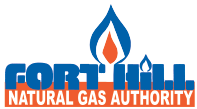Public Awareness
The United States relies on natural gas for nearly one-fourth of its energy. Natural gas is clean, convenient, and efficient, which makes it the country's most popular home heating fuel. Each day, underground pipelines carry natural gas safely and efficiently to millions of homes and businesses across the United States. Natural gas is used to heat homes and businesses, heat water, cook meals, fuel for vehicles, electric power generation, and for many industrial processes. In our community, underground pipelines provide natural gas service to homes, businesses, schools and industries. Fort Hill Natural Gas Authority (FHNGA) operates a safe and efficient pipeline distribution network of stations, mains, services and meters. Natural gas is purchased by FHNGA from various sources and delivered to three gate stations located in Anderson County. It is then distributed to pressure regulating stations that are strategically located on FHNGA's system through main and service lines to your gas meter and into your home or business.
Pipeline Purpose and Reliability
The pipeline transportation system in the United States is one of the safest and most efficient means of transporting energy products. The National Transportation Safety Board has found that pipelines provide the highest level of public safety as compared to other transportation modes. Pipelines have fewer accidents causing personal injury than any other form of transportation. In addition, pipeline operators are extensively regulated by Federal and State regulations with regard to design, construction, operation and maintenance.
Safety is the number one priority of America's natural gas industry. At FHNGA, our main goal is to deliver natural gas reliably and safely to you, our customer. In doing so, we want you to know what to do if you ever smell gas or if a natural gas pipeline emergency occurs where you live or work.
Hazard Awareness and Prevention Measures
Like all forms of energy, natural gas must be handled properly. A gas leak caused by damage to a pipeline may pose a hazard and has the potential to ignite. FHNGA works diligently to ensure pipeline safety through a variety of measures including:
- Coordination with Palmetto Utility Protection Services (P.U.P.S) 811
- Inspection Programs and Workforce Qualifications
- 24/7 Emergency Dispatch 1-800-573-5556
- Design and Construction Practices
- State of SC Office of Regulatory Staff
FHNGA maintains an ongoing relationship with local emergency response officials, in order to prepare for and respond to any pipeline emergency. In an emergency call FHNGA or 911.
Leak Recognition and Response
- Potential hazards of products transported
- Pipelines carry gaseous material under high pressure
- Natural gas is colorless and lighter than air
- Natural gas is flammable
- Any pipeline leak can be potentially hazardous
- How to recognize a pipeline leak. Sight-Smell-Sound
- Sight - Look for dirt being blown in the air, mist, fog, bubbling in standing water, fire coming from the ground or dead or dying vegetation.
- Sound - Listen for any unusual noise like a roaring, blowing, hissing or whistling.
- Smell - Notice any unusual odor. Natural gas is odorless. FHNGA adds an odorant to natural gas to give it a noticeable odor (rotten eggs).
- Response to a pipeline leak
If you detect a gas leak:
- Abandon any motorized equipment you may be operating.
- If in a building, ventilate by opening doors and windows, exit the building immediately.
- Move to a safe environment immediately.
- Call FHNGA immediately at 1-800-573-5556 or 864-859-6375 (use a neighbor's telephone). In the event of fire or explosion, call 911.
- Do not assume someone else will report condition.
- Provide exact location, including any cross streets.
- Avoid flames and operating electrical appliances and/or equipment. Do not smoke or light matches.
- Do not use telephones including cell, flashlights or other items that can produce a spark.
- Warn others to stay away.
- Do not attempt to correct the problem.
Damage Prevention
The greatest risk to underground natural gas pipelines is the accidental damage during excavation. Over 60% of damages are caused by no locate notice in South Carolina. Even minor damage such as a dent, scrape, crease or gouge to a pipeline coating may cause a leak or failure. The law requires a three full working day notice before you dig excluding the day of the notice. If 811 is notified, 99% of the time will result in no damage to a Utility. Call before you dig! It's the law! SC 811 Fact Sheet Click HERE

Notify PUPS by calling 811. It's a free call! PUPS will let us know who you are and where you intend to dig www.sc811.com
Attorney General's Office Reminds SC to Call Before You Dig Click Here
REPORT ANY SUSPICIOUS ACTIVITIES TO FHNGA 1-800-573-5556



